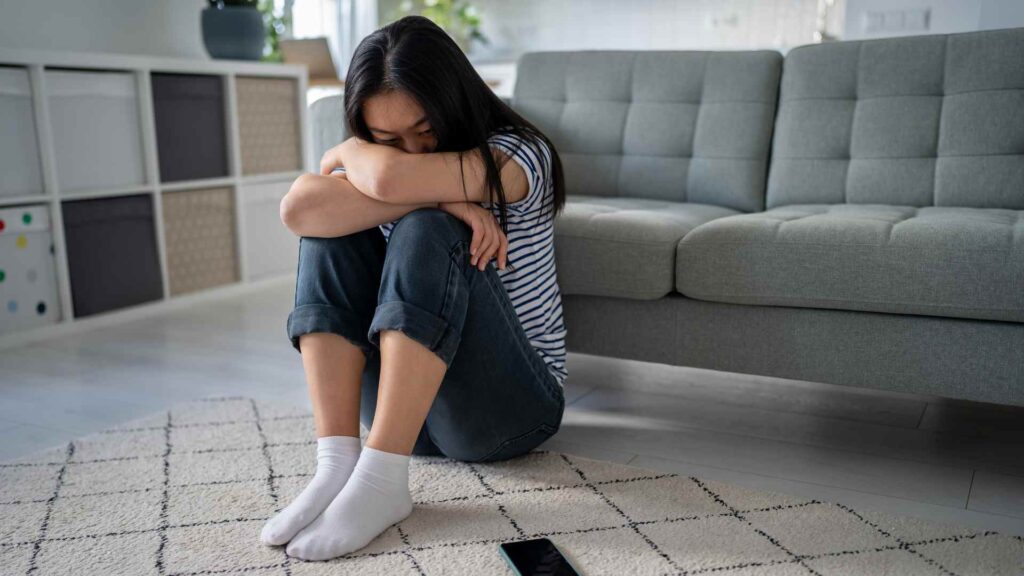Friendship breakups can be as painful as romantic ones.
This guide will help you understand, cope, and heal, offering practical advice and support.
Understanding Friendship Breakups
What is a Friendship Breakup?
A friendship breakup occurs when a close friendship ends, often causing significant emotional pain.
Unlike romantic breakups, friendship breakups are less talked about but can be just as impactful.
They can leave you feeling confused, hurt, and alone, especially if the friendship was a major part of your life.
Common Reasons for Friendship Breakups
Understanding why friendships end can help you process your emotions and find closure. Here are some common reasons:
- Growing Apart: As people grow and change, their interests, values, and priorities can shift, leading to a natural drifting apart.
- Betrayal or Broken Trust: Trust is a cornerstone of any relationship. Betrayal, whether through lies, gossip, or other forms of dishonesty, can irreparably damage a friendship.
- Life Changes: Major life events like moving to a new city, getting married, or having children can change the dynamics of a friendship.
- Miscommunication or Unresolved Conflicts: Persistent misunderstandings or unresolved arguments can create a rift between friends, sometimes leading to an eventual breakup.
The Emotional Impact
The Grieving Process
Friendship breakups often trigger a grieving process similar to that of romantic relationships. You might experience:
- Denial: Difficulty accepting that the friendship is over.
- Anger: Feeling frustrated or resentful about the situation.
- Bargaining: Trying to repair the friendship or wondering what could have been done differently.
- Depression: Experiencing sadness and loneliness.
- Acceptance: Coming to terms with the end of the friendship and beginning to move on.
Coping with the Loss
Coping with a friendship breakup involves acknowledging your feelings and giving yourself permission to grieve. Here are some ways to manage your emotions:
- Journal Your Feelings: Writing down your thoughts can help you process your emotions.
- Talk to Someone You Trust: Sharing your feelings with a family member or another friend can provide comfort and perspective.
- Engage in Activities You Enjoy: Distracting yourself with hobbies and activities can help you feel better.
The Importance of Self-Care
Taking care of yourself is crucial during this time. Here are some self-care practices to consider:
- Exercise: Physical activity can boost your mood and reduce stress.
- Healthy Eating: Nourishing your body with healthy foods can improve your overall well-being.
- Relaxation Techniques: Practices like meditation, yoga, or deep breathing can help you manage stress and anxiety.
- Rest: Ensure you’re getting enough sleep to help your body and mind recover.
Understanding the reasons behind a friendship breakup and acknowledging the emotional impact can set the stage for healing and moving forward. In the next section, we’ll delve deeper into reflecting on the relationship and identifying red flags that may have contributed to the breakup.

Reflecting on the Relationship
Looking Back
Reflecting on your friendship can provide valuable insights and help you come to terms with its end. Consider the following:
- Positive Aspects: What did you enjoy about the friendship? Reflecting on the good times can bring some comfort.
- Lessons Learned: Every relationship teaches us something. What did you learn about yourself, your values, and your needs from this friendship?
Identifying Red Flags
Understanding the warning signs of an unhealthy friendship can help you avoid similar issues in the future. Some common red flags include:
- Consistent Negativity: Did the friendship leave you feeling drained or stressed more often than not?
- Lack of Support: Was there a lack of mutual support and understanding? True friends lift each other up.
- One-Sided Effort: Did you often feel like you were putting in more effort than your friend? A balanced friendship requires effort from both sides.
- Frequent Conflicts: Were there frequent arguments or unresolved conflicts? Constant tension can be a sign of deeper issues.
Personal Growth
A friendship breakup, while painful, can also be an opportunity for personal growth. Here are some ways to turn this experience into a positive one:
- Self-Reflection: Take some time to reflect on your role in the friendship. What could you have done differently? This isn’t about blaming yourself but understanding how you can improve in future relationships.
- Setting Boundaries: Use this experience to better understand your boundaries and how to communicate them effectively in future friendships.
- Building Resilience: Overcoming a friendship breakup can make you more resilient and better equipped to handle future challenges.
How the Experience Can Help You Grow
- Enhanced Self-Awareness: Understanding your own needs and behaviors better.
- Improved Communication Skills: Learning how to express your feelings and resolve conflicts constructively.
- Stronger Future Friendships: Applying the lessons learned to build healthier and more fulfilling relationships.
Reflecting on the relationship allows you to gain closure and clarity. It’s a crucial step in the healing process, helping you to understand what went wrong and how you can foster better friendships in the future. Next, we’ll explore how to move forward and rebuild your social circle after a friendship breakup.

Moving Forward
Creating Space for Healing
Healing from a friendship breakup requires time and space. Here are some strategies to help you create an environment conducive to healing:
- Distance Yourself: It might be beneficial to take a break from seeing or communicating with your ex-friend. This can help you gain perspective and reduce emotional turmoil.
- Declutter Your Digital Space: Remove reminders of the friendship from your social media and digital devices. This could mean unfollowing or muting your ex-friend’s accounts to avoid constant reminders.
- Focus on Yourself: Use this time to reconnect with yourself. Engage in activities that bring you joy and fulfillment.
Rebuilding Your Social Circle
Losing a friend can create a void, but it’s also an opportunity to build new connections and strengthen existing ones. Here are some tips to help you rebuild your social circle:
- Join Clubs or Groups: Engage in activities or hobbies that interest you. This can be a great way to meet like-minded people.
- Attend Social Events: Attend gatherings, parties, or community events where you can meet new people.
- Be Open to New Friendships: Be open to forming new friendships, even if they are different from your previous ones. Every person brings something unique to your life.
Tips for Making New Friends
- Be Genuine: Authenticity is key in building new friendships. Be yourself and let others get to know the real you.
- Show Interest: Ask questions and show interest in others’ lives. People appreciate genuine curiosity and engagement.
- Be Patient: Building new friendships takes time. Don’t rush the process; let it develop naturally.
Engaging in Social Activities and Communities
- Volunteer: Volunteering is a great way to meet people while contributing to a cause you care about.
- Take a Class: Enroll in a class or workshop to learn something new and meet others with similar interests.
- Join Online Communities: Participate in online forums or social media groups that align with your interests.
Reconnecting with Old Friends
Sometimes, a friendship breakup can lead you to reconnect with old friends you may have lost touch with. Here’s how to rekindle those relationships:
- Reach Out: Send a friendly message or call to catch up. Let them know you’ve been thinking about them.
- Be Honest: Share what you’ve been going through. Honesty can deepen your connection and rebuild trust.
- Make Plans: Arrange to meet up or spend time together. Shared experiences can strengthen your bond.
Moving forward after a friendship breakup involves creating space for healing, rebuilding your social circle, and possibly reconnecting with old friends.
This process takes time, but with patience and effort, you can emerge stronger and with a renewed sense of connection. Next, we’ll explore how to communicate after a friendship breakup, including seeking closure and setting boundaries.

Communicating After the Breakup
If You Need Closure
Sometimes, closure is necessary to fully move on from a friendship breakup. If you feel the need to reach out for closure, consider these steps:
- Reflect First: Before contacting your ex-friend, take some time to reflect on what you hope to achieve. Closure can mean different things to different people.
- Be Clear and Concise: When you reach out, be clear about your intentions. Express your feelings honestly but respectfully.
- Accept Their Response: Be prepared for any response, including no response. Understand that they might not be ready or willing to engage.
How to Reach Out
- Write a Letter or Email: Sometimes, writing a letter or email can be an effective way to articulate your thoughts and feelings.
- Call or Text: If you prefer a more immediate form of communication, a phone call or text message might be appropriate.
- In-Person Meeting: If both parties are open to it, meeting in person can provide a more personal touch.
Setting Boundaries
Establishing boundaries is crucial for your well-being, especially after a friendship breakup. Here’s how to set and maintain healthy boundaries:
- Define Your Needs: Identify what you need to feel safe and comfortable. This could include limiting contact or avoiding certain topics.
- Communicate Clearly: Clearly express your boundaries to your ex-friend if you’re still in contact. Use “I” statements to communicate your needs without blaming them.
- Enforce Your Boundaries: Stick to your boundaries even if it’s challenging. Consistency is key to ensuring they are respected.
Examples of Boundaries
- No Contact: Deciding to cease all communication for a period to heal.
- Limited Contact: Only communicating about specific topics or during certain times.
- Social Media Boundaries: Muting or unfollowing your ex-friend on social media to avoid constant reminders.
When to Let Go Completely
In some cases, it’s best to let go of the friendship entirely. Here’s how to recognize when it’s time to move on and how to do it gracefully:
- Persistent Negative Feelings: If thinking about the friendship continuously brings up negative emotions, it might be best to let go.
- Lack of Respect: If your ex-friend consistently disrespects your boundaries or makes you feel undervalued, it’s a sign to move on.
- Unresolved Issues: If the issues that led to the breakup remain unresolved and there’s no sign of improvement, it might be time to let go.
How to Let Go
- Accept Your Emotions: Acknowledge and accept your feelings about the breakup. It’s okay to feel sad, angry, or relieved.
- Focus on the Future: Shift your focus from the past to the future. Think about what you want from your future friendships.
- Seek Support: Lean on other friends, family, or a therapist for support during this time.
Communicating after a friendship breakup, whether seeking closure, setting boundaries, or deciding to let go, is a crucial part of the healing process.
It allows you to gain clarity, protect your well-being, and move forward with a clearer understanding of your needs and limits. In the next section, we’ll discuss how to avoid future friendship breakups by building healthy, lasting relationships.

Avoiding Future Friendship Breakups
Building Healthy Friendships
Creating strong, lasting friendships requires effort and mutual respect. Here are some key elements to focus on:
- Trust: Trust is the foundation of any healthy relationship. Be reliable and honest to build trust with your friends.
- Respect: Show respect for your friends’ boundaries, opinions, and feelings. Respect creates a safe space for open communication.
- Support: Be supportive during both good times and bad. Celebrate your friends’ successes and be there for them during challenges.
- Equality: Ensure that the friendship is balanced, with both parties putting in effort and enjoying benefits equally.
Effective Communication
Good communication is essential for maintaining healthy friendships. Here are some skills to develop:
- Active Listening: Pay attention to what your friends are saying without interrupting. Show that you understand by summarizing or reflecting back what you’ve heard.
- Expressing Yourself: Share your thoughts and feelings honestly and respectfully. Use “I” statements to communicate without blaming.
- Conflict Resolution: Learn to address conflicts calmly and constructively. Focus on finding solutions rather than assigning blame.
Tips for Better Communication
- Be Open and Honest: Transparency helps prevent misunderstandings.
- Ask Questions: Show interest in your friends’ lives by asking questions and being curious.
- Be Mindful of Non-Verbal Cues: Pay attention to body language, tone of voice, and facial expressions.
Maintaining Balance
A healthy friendship requires a balance of giving and receiving. Here’s how to ensure mutual respect and reciprocity:
- Set Boundaries: Clearly communicate your boundaries and respect those of your friends.
- Practice Reciprocity: Make sure both parties are contributing to the friendship. This can include emotional support, time, and effort.
- Check-In Regularly: Periodically check in with your friends to ensure that both of you are happy with the balance in your relationship.
Ensuring Mutual Respect
- Value Each Other’s Time: Be punctual and respectful of your friends’ time commitments.
- Appreciate Differences: Embrace and respect differences in opinions, lifestyles, and backgrounds.
- Give and Take: Ensure that both parties feel valued and supported. Avoid relationships where one person is always giving and the other is always taking.
Building healthy friendships involves trust, respect, effective communication, and maintaining a balance.
By focusing on these elements, you can foster strong, lasting relationships that are less likely to end in a breakup. In the next section, we will share real-life stories and advice from individuals who have navigated friendship breakups successfully.
Real-Life Stories and Advice
Personal Stories
Hearing from others who have experienced friendship breakups can provide comfort and perspective. Here are a few personal accounts:
Anna’s Story: Rediscovering Self-Worth
Anna had been friends with Lily since childhood. Over the years, she noticed that their friendship had become increasingly one-sided.
Lily often dismissed Anna’s feelings and rarely showed interest in her life. After a particularly hurtful argument, Anna decided to end the friendship. It was painful, but she soon realized how much happier and more confident she felt. Anna began to reconnect with old friends and made new ones who valued her.
Mark’s Story: The Importance of Boundaries
Mark’s friendship with James started in college. They were inseparable, but as they grew older, James became increasingly demanding and invasive.
Mark felt suffocated but was afraid to speak up. After a heated argument, Mark decided to set clear boundaries. He communicated his needs and limits to James. While their friendship didn’t survive, Mark learned the importance of boundaries and has since built healthier relationships.
Sophia’s Story: Finding Closure
Sophia and Emily were best friends for over a decade. A misunderstanding led to a fallout, and they stopped speaking. Sophia felt an overwhelming need for closure.
She reached out to Emily, expressing her feelings and seeking to understand what went wrong. They had a heartfelt conversation, which provided the closure Sophia needed. Although they didn’t rekindle their friendship, Sophia was able to move on with a sense of peace.
Expert Opinions
Experts offer valuable insights into navigating friendship breakups. Here’s what some psychologists and relationship experts have to say:
Dr. Emily Johnson, Psychologist
“Friendship breakups can be as emotionally challenging as romantic breakups. It’s important to allow yourself to grieve and process your feelings. Reflect on the relationship and understand what went wrong. This self-awareness will help you build healthier friendships in the future.”
Dr. Michael Rivera, Relationship Expert
“Effective communication is crucial in any relationship. Many friendship breakups stem from unresolved conflicts and miscommunications. Learning to communicate openly and honestly can prevent many issues. If a friendship ends, it’s essential to set boundaries and prioritize your mental well-being.”
Dr. Sarah Collins, Therapist
“Friendship breakups are a normal part of life. People grow and change, and sometimes friendships don’t survive these changes. Use the experience as an opportunity for personal growth. Focus on self-care and rebuilding your social circle with positive, supportive relationships.”
Practical Advice from Those Who Have Been There
Here are some practical tips from people who have successfully navigated friendship breakups:
- Stay Busy: Engage in hobbies and activities that you enjoy. Staying busy can help distract you and make the healing process easier.
- Seek Support: Don’t hesitate to lean on other friends, family, or a therapist for support. Talking about your feelings can be incredibly healing.
- Give It Time: Healing from a friendship breakup takes time. Be patient with yourself and allow the process to unfold naturally.
- Focus on the Positive: Reflect on what you’ve learned from the experience and how it can help you in future relationships.
Real-life stories and expert advice can provide valuable insights and comfort as you navigate a friendship breakup.
These perspectives remind us that we are not alone and that it’s possible to emerge from the experience stronger and more resilient. In the next section, we’ll address some frequently asked questions about friendship breakups and provide practical tips for specific scenarios.


